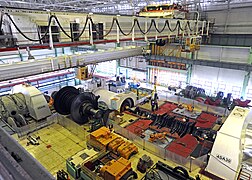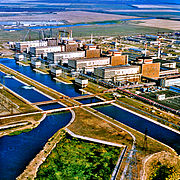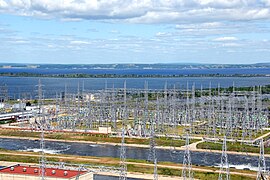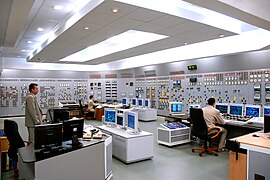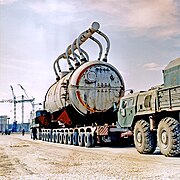Balakovo Nuclear Power Plant
| Balakovo Nuclear Power Plant | |
|---|---|
 Balakovo Nuclear Power Plant | |
 | |
| Country | Russia |
| Coordinates | 52°5′28″N 47°57′19″E / 52.09111°N 47.95528°E |
| Status | Operational |
| Construction began | December 1, 1980 |
| Commission date | May 23, 1986 |
| Operator | Rosenergoatom |
| Nuclear power station | |
| Reactor type | VVER |
| Power generation | |
| Units operational | 4 x 1,000 MW |
| Units under const. | 1 x 1,000 MW |
| Nameplate capacity | 4,000 MW |
| Capacity factor | 82.9% |
| Annual net output | 29,062 GW·h |
| External links | |
| Website | Official website |
| Commons | Related media on Commons |
Balakovo nuclear power station (Russian: Балаковская АЭС, romanized: Balakovskaya AES []) is located in the city of Balakovo, Saratov Oblast, Russia, about 900 kilometres (560 mi) south-east of Moscow. It consists of four operational reactors; fifth and sixth unit construction cancelled. Owner and operator of the nuclear power station is Rosenergoatom.
Balakovo NPP participates in a twinning program between nuclear power stations in Europe and Russia; since 1990 it has been in partnership with Biblis Nuclear Power Plant.[1]
Reactor data
[edit]The Balakovo Nuclear Power Plant has four operating units:
| Unit[2] | Reactor type | Net capacity |
Gross capacity |
Construction started |
Electricity grid |
Commercial operation |
Shutdown |
|---|---|---|---|---|---|---|---|
| Balakovo-1 | VVER-1000/320 | 950 MW | 1,000 MW | 1980-12-01 | 1985-12-28 | 1986-05-23 | 2045 planned |
| Balakovo-2 | VVER-1000/320 | 950 MW | 1,000 MW | 1981-08-01 | 1987-10-08 | 1988-01-12 | 2043 planned[3] |
| Balakovo-3 | VVER-1000/320 | 950 MW | 1,000 MW | 1982-11-01 | 1988-12-25 | 1989-04-08 | 2048 planned[4] |
| Balakovo-4 | VVER-1000/320 | 950 MW | 1,000 MW | 1984-04-01 | 1993-05-12 | 1993-12-22 | 2053 planned |
| Balakovo-5 | VVER-1000/320 | 950 MW | 1,000 MW | 1987-04-01 | - | - | Construction suspended 1992-12-28 |
| Balakovo-6 | VVER-1000/320 | 950 MW | 1,000 MW | 1988-05-01 | - | - | Construction suspended 1992-12-28 |
In 2018 Rosatom announced it had developed a thermal annealing technique for reactor pressure vessels which ameliorates radiation damage and extends service life by between 15 and 30 years. This had been demonstrated on unit 1.[5]
Gallery
[edit]-
Interior View
-
Steam Turbine Maintenance
-
Reactor under Construction
-
Aerial View
-
Distribution Station
-
Control Room
-
Steam Generator Transport
-
Unit 5 Construction
Incidents
[edit]On 27 June 1985 during startup of the first reactor unit, a human error (later attributed to inexperience and haste) unexpectedly opened a pressurizer relief valve, and 300 °C (572 °F) steam caused an explosion of the turbine and entered the staff work area. Fourteen people were killed.[6] This event is cited as one of the predecessors of the Chernobyl disaster.[7]
See also
[edit]References
[edit]- ^ "Kraftwerk Biblis: WANO-Partnerschaft mit Balakovo jährt sich zum 20. Mal" (in German). RWE. 2010-09-29. Archived from the original on 2011-09-11. Retrieved 2010-10-18.
- ^ Power Reactor Information System of the IAEA: „Russian Federation: Nuclear Power Reactors“
- ^ "Годовой отчёт 2017 с. 73-75" (PDF). rosenergoatom.ru. 24 April 2018.
- ^ "Срок эксплуатации энергоблока №3 Балаковской АЭС продлен на 30 лет".
- ^ "Rosatom launches annealing technology for VVER-1000 units". World Nuclear News. 27 November 2018. Retrieved 28 November 2018.
- ^ "Accidents 1980's". nuclearfiles.org. 2009-05-17. Archived from the original on 2009-05-17. Retrieved 2017-02-18.
- ^ Medvedev, Grigory. "The Truth About Chernobyl", I. B, Tauris, London, 1 January 1991, ISBN 1850433313.
External links
[edit]- Balakovo NPP site – website in English
- Rosenergoatom – website in Russian and English
- Bellona Foundation, Balakovo NPP – International environmental organization
- Nuclear power stations built in the Soviet Union
- Nuclear power stations in Russia
- Buildings and structures in Saratov Oblast
- Nuclear power stations with reactors under construction
- Radiation accidents and incidents
- Nuclear power stations using VVER reactors
- 1985 in the Soviet Union
- 1985 industrial disasters

